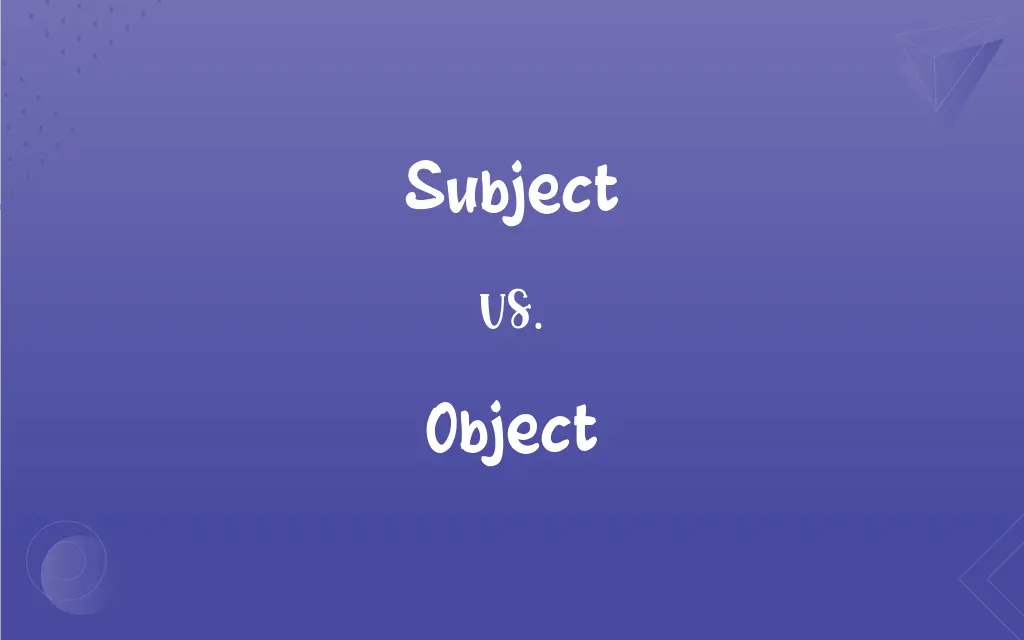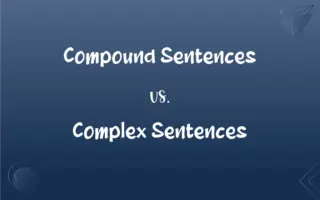Subject vs. Object: What's the Difference?
Edited by Aimie Carlson || By Harlon Moss || Updated on October 21, 2023
The subject performs the action in a sentence, while the object receives the action. For example, in "She (subject) kicked the ball (object)," "She" is acting, and "ball" is being acted upon.

Key Differences
In grammatical terms, the subject of a sentence is what it's about, often the doer of the action. The object, conversely, is the receiver of this action. If someone says, "Tom (subject) loves pizza (object)," Tom is the one having the feeling, and pizza is what that feeling is directed at.
The subject is vital for understanding the main thrust of a sentence. It often comes before the verb. The object, on the other hand, provides additional context and typically comes after the verb. For instance, in "Dogs (subject) chase cats (object)," we understand that dogs are the ones doing the chasing and cats are being chased.
Not every sentence will have both a subject and an object, but most will have a subject. "It rains" has a subject, "It," but no object. However, when discussing actions directed at something or someone, both subject and object become pertinent. "She (subject) sings" lacks an object, but "She (subject) sings songs (object)" includes both.
The subject usually aligns with the verb in terms of number (singular/plural) and person (first/second/third person). The object, however, doesn't influence the verb's form. In "They (subject) watch movies (object)," the verb "watch" agrees with the plural subject "They," regardless of the object "movies."
In complex sentences, there might be both direct and indirect objects. Still, there's typically just one main subject. "She (subject) gives him (indirect object) a gift (direct object)." Here, "She" remains the primary actor, while the gift and him are recipients of different aspects of the action.
ADVERTISEMENT
Comparison Chart
Definition
The doer or main topic of a sentence.
The receiver of the action in a sentence
Relation to Verb
Performs the action.
Receives the action.
Position in Sentence
Typically precedes the verb.
Usually follows the verb.
Agreement with Verb
Influences the verb's form.
Doesn't influence the verb's form.
Existence in Sentences
Almost always present.
May or may not be present.
ADVERTISEMENT
Subject and Object Definitions
Subject
What or whom the sentence is about.
The book is on the table, where book is the subject.
Object
The target or goal of an action or emotion.
She loves chocolate, where chocolate is the object.
Subject
The noun, pronoun, or noun phrase governing the verb.
She dances gracefully, with She as the subject.
Object
The noun, pronoun, or noun phrase affected by the verb's action.
They play football, with football as the object.
Subject
The entity performing the action in a sentence.
Birds fly has birds as the subject.
Object
A word or group of words receiving the direct action of the verb.
The chef cooks dinner, with dinner as the object.
Subject
The part of the sentence that indicates what it states or predicates something about.
The teacher taught a lesson, where teacher is the subject.
Object
The entity that the action of the verb is directed towards.
He opened the door, where door is the object.
Subject
The main topic or focus of a sentence.
In the sentence, The cat sleeps, the cat is the subject.
Object
The receiver of the action in a sentence.
He reads a book, where book is the object.
Subject
Being in a position or in circumstances that place one under the power or authority of another or others
Subject to the law.
Object
A specific, individual, material entity, especially one that is not living or not sentient.
Object
A focus of attention, feeling, thought, or action
A product that was so bad it became an object of derision.
FAQs
Can a sentence exist without a subject?
In English, most sentences require a subject, but in imperative sentences, the subject is implied, e.g., "Run!"
Can a sentence have both a direct and an indirect object?
Yes, e.g., "She gives him a book," where "him" is the indirect object and "book" is the direct object.
What is the role of the subject in a sentence?
The subject is the main focus or the doer of the action in a sentence.
How does the object differ from the subject?
The object is the receiver of the action, while the subject performs the action.
How can I identify the subject in complex sentences?
The subject usually agrees in number with the verb and is what the sentence is primarily about.
Are subjects always nouns or pronouns?
Most of the time, yes, but noun phrases can also serve as subjects.
Is the object always placed after the verb?
In standard English sentence structures, yes, but word order can vary in questions and some other constructions.
Can "it" serve as both a subject and an object?
Yes, e.g., "It (subject) hit the ball (object)."
Are prepositional objects the same as direct objects?
No, prepositional objects follow prepositions, while direct objects directly receive the action of the verb.
Can one verb have two different objects?
Yes, especially with ditransitive verbs, e.g., "She sent him a letter."
Do all verbs need an object?
No, intransitive verbs don't require objects, e.g., "She sleeps."
Can an entire clause be an object?
Yes, e.g., "He said that she was coming," where "that she was coming" is the object clause.
Do subjects influence verb tense?
No, but they do influence verb agreement in terms of number and person.
In the sentence, "The teacher taught the students," which is the object?
"Students" is the object.
Are objects only nouns or can they be other parts of speech?
While often nouns or noun phrases, objects can also be pronouns, clauses, or infinitive phrases.
Can the subject and object be the same in a sentence?
No, they have distinct roles, but a sentence can be reflexive, e.g., "She hurt herself," where "herself" is the reflexive object.
Why is understanding subjects and objects important?
It aids in constructing grammatically correct sentences and enhances comprehension.
Can sentences have multiple subjects or objects?
Yes, e.g., "John and Mary (multiple subjects) eat apples and oranges (multiple objects)."
Can an infinitive phrase function as a subject?
Yes, e.g., "To read (subject) is fun."
Are subjects necessary in questions?
Yes, but the word order may change, e.g., "Is she coming?"
About Author
Written by
Harlon MossHarlon is a seasoned quality moderator and accomplished content writer for Difference Wiki. An alumnus of the prestigious University of California, he earned his degree in Computer Science. Leveraging his academic background, Harlon brings a meticulous and informed perspective to his work, ensuring content accuracy and excellence.
Edited by
Aimie CarlsonAimie Carlson, holding a master's degree in English literature, is a fervent English language enthusiast. She lends her writing talents to Difference Wiki, a prominent website that specializes in comparisons, offering readers insightful analyses that both captivate and inform.
































































